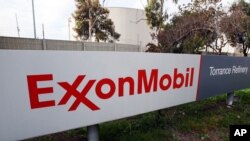New York’s attorney general is investigating allegations that Texas-based ExxonMobil Corporation, the world’s largest energy company, suppressed evidence of its own researchers linking fossil fuel emissions to climate change.
Investigators may also look into the company’s support for political lobbying and public information campaigns that called climate change research into question.
Tracy Hester, a legal expert at the University of Houston, said the investigation centers on what the company told its shareholders. “The heart of it is that there were misleading statements by Exxon that had the effect of misleading investors to the true risks and dangers posed by buying their stock,” he said.
According to Hester, New York is using a state statute called the Martin Act, which gives the state's top law enforcement official broad powers to investigate financial fraud.
“New York enjoys the unique position of actually having the New York Stock Exchange located in Manhattan,” he said. “As a result, they have a unique jurisdictional hook, and they have a strong state statute. It is going to be difficult for other states to invoke the same sort of contacts and jurisdiction.”
Still, he said, it is possible that some other states or even the federal government could investigate ExxonMobil using Racketeer Influenced and Corrupt Organizations (RICO) statutes.
Carbon research
Ken Cohen, ExxonMobil’s vice president for communications, tweeted a response to the New York allegations, saying, “Here we go again,” followed by a link to data on the company’s research. He said ExxonMobil researchers have been conducting climate studies for decades and have presented their findings in more than 50 scientific publications.
One person who has worked closely with Exxon and other companies on these issues is Michael Webber, deputy director of the Energy Institute at the University of Texas in Austin.
“They have spent hundreds of millions of dollars around particular lines of research around biofuels, which is a low-carbon fuel source if it is done the right way, and carbon capture and sequestration and separation technologies," Webber said, "so it is hard to say that carbon wasn’t on their mind or that they were trying to suppress it when they are actively developing technologies to make money from decarbonization.”
As for ExxonMobil’s shareholder disclosures inadequately representing what its own engineers and researchers had concluded, Webber said differences in statements from corporate executives and technical people in the same company are fairly common across industries.
“This one might have different weight and different legal ramifications," he said, “but I would say certainly there is often a mismatch between what the bosses at the top say and what the engineers along the line say.”
Climate change
Among the American energy companies taking strong positions to combat climate change is Houston-based Southwestern Energy, the only U.S. company to join international oil and gas companies in a U.N.-supported program to monitor and mitigate methane emissions. Methane, the basic component of natural gas, is one of the most potent greenhouse gases.
Mark Boling, who heads Southwestern Energy’s program to detect and repair methane leaks, said he often meets people from other companies who scoff at global warming concerns. But such people do not represent everyone in the industry, he said.
“There are a lot of people concerned over global warming and what is happening, [and] they want to step up and do the right thing,” he said. “It is not always necessarily shared up and down the whole chain of command in different organizations. Luckily, I happen to be in an organization where it is.”
Southwestern Energy is also part of the One Future Coalition, which supports the development of new technology to improve operations and environmental protection.




